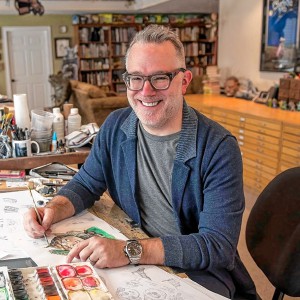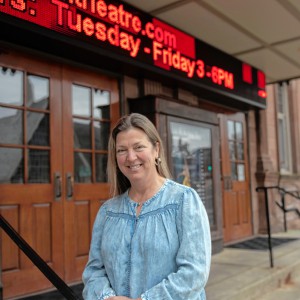Sunderland psychologist, inspired by personal experience, is expert in field of religious trauma
| Published: 07-19-2023 2:04 PM |
It was during her freshman year of college that Marlene Winell’s faith in Jesus began slipping.
As a child of missionaries, Winell had grown up dedicated to spreading the word of Christ, attending Christian rock concerts and witnessing baptisms on California’s beaches. But suddenly, driven by a “desire for truth,” her entire life — her family and her community — was being cast into doubt.
“Christians did not have a monopoly … on the fruits of the spirits,” she remembers thinking as a college freshman. “They had no monopoly on living a good life, being ethical or moral.”
Filled with guilt and frustration, Winell began confronting her problems. Years later, Winell has not only dealt with her own disillusionment, but has become a therapist based in Sunderland who specializes in helping others recover from religious trauma. She’s also written and published a self-help book called “Leaving the Fold,” to help people navigate the barriers to and complicated emotions of leaving religion.
A recent study by the Global Center for Religious Research found that around one-third of U.S. adults have experienced religious trauma at some point in their life. Presumably, a certain number of them experienced the same kind of nightmares, shame, depression, fear, stress and/or anxiety that Winell went through. Nevertheless, religious trauma is a relatively new concept for psychologists and counselors that began showing up 20 years ago.
Sitting at her kitchen table with her hands cupping a green mug, Winell recounted her path to becoming an expert in this new field.
Winell grew up in China with her missionary parents and four siblings. In middle school, she was already so devout to Christianity that she wrote a paper in eighth grade on “Why dancing is wrong because it is too sexy.”
“I was very emotional about what I considered my personal relationship with Jesus,” she reflected.
Article continues after...
Yesterday's Most Read Articles
 Granby Bow and Gun Club says stray bullets that hit homes in Belchertown did not come from its range
Granby Bow and Gun Club says stray bullets that hit homes in Belchertown did not come from its range
 Super defers Amherst middle school principal pick to successor; one finalist says decision is retaliation for lawsuit
Super defers Amherst middle school principal pick to successor; one finalist says decision is retaliation for lawsuit
 ‘Home away from home’: North Amherst Library officially dedicated, as anonymous donor of $1.7M revealed
‘Home away from home’: North Amherst Library officially dedicated, as anonymous donor of $1.7M revealed
 Political newcomer defeats Shores Ness for Deerfield Selectboard seat
Political newcomer defeats Shores Ness for Deerfield Selectboard seat
 A DIY approach to flying: Local pilots build and help build their own aircraft
A DIY approach to flying: Local pilots build and help build their own aircraft
 Back to the screen: Amherst authors’ popular ‘Spiderwick Chronicles’ gets a new streaming adaptation
Back to the screen: Amherst authors’ popular ‘Spiderwick Chronicles’ gets a new streaming adaptation
In 1968, Winell’s family moved to southern California, where she finished her last two years of high school. That’s when her Christian faith started to evolve.
“It was the summer of love and hippies were everywhere,” she said. “We had our Christian version of it — we went to church, wearing whatever we wanted to and maybe barefoot. … Christian rock ’n’ roll was getting started. It was all very exciting.”
After high school, Winell enrolled at the University of California Irvine to major in social ecology and “to be a witness to all [the] lost souls” who hadn’t been enlightened by the love of Jesus. She studied the Bible and participated in prayer services while living in a Christian commune.
“We didn’t mind being called Jesus freaks, because we were,” Winell said. “We said we were high on Jesus. We didn’t take drugs, we didn’t need drugs.”
Psychology classes were a game changer for Winell because she learned about what makes people tick. She also learned about feminism, which changed her perspective on gender roles and her old expectations of becoming a pastor’s wife.
Exposure to different courses, and people from different cultural backgrounds, left Winell feeling puzzled.
“My own consciousness was changing,” she recalled, “in terms of diversity, in terms of feminism, and getting disenchanted with the church hierarchy.”
After college, Winell got married and she officially left the faith with her husband at the time. But leaving the faith was “a combination of pushes and pulls,” with the pushes being the disenchantment with the church and hierarchy in the Bible, and the pulls being the good things in the world and Winell feeling like the world “really opened up.”
Throughout her research on religious trauma, Winell said she found a pattern of symptoms. People who try to leave their faith often struggle to find meaning and purpose in life, and experience ongoing anxiety, feelings of being unsafe and depression.
“Because the church gives you this huge purpose of serving this kingdom where you’re aligned with God … you come down from that and people have to figure out, ‘OK, what do I live for? Why should I live?’” she said. “It can be a pretty big existential question that people grapple with. … This can affect sexuality, decision-making, social networking and creativity.”
Winell decided to further her education, obtaining a master’s degree in social ecology at the University of California Irvine in 1977 and then a doctorate from Penn State University in human development and family studies in 1983. After graduate school, Winell wrote about the “consequences of being raised in a fundamentalist belief system.” She discovered how many people related to her work on not only the impact of being in the religion but also the trauma of leaving the religion.
“Because the faith really dictates what you think about everything,” Winell explained, “What you think about yourself, what you think about other people, what you think about the world, career politics, the future of the planet, your own afterlife — you’re supposed to be worried that you’re gonna go to hell if you don’t do it right.”
Winell presented her work at a psychology conference in New York, and a lot of people in attendance wanted copies of her research.
“I had no idea whether people would understand what I was even talking about. But a lot of people did,” she said.
In 1987, Winell became a licensed psychologist and opened her own practice. To better understand religious recovery, she conducted research and interviews with clients, and was later inspired to write the self-help book “Leaving the Fold,” which was published in 1994 and republished in 2006.
Winell is also known for coining the term “Religious Trauma Syndrome” after realizing that the problem of religious trauma was “broader and deeper and more serious” than she originally thought.
“When you give something a name, people don’t feel alone. People don’t feel like it’s their fault or like they’re crazy. It’s really important for people to know that they have not created the problem,” Winell explained. “What I’ve tried to emphasize is that there is also a big area of mental and emotional damage that has gone unnoticed...”
Over the last 20 years, Winell said there has been a lot of research and treatment development focused on trauma, which helps broaden the understanding of Religious Trauma Syndrome as it is similar to post-traumatic stress disorder (PTSD) and complex post-traumatic stress disorder (CPTSD).
“You have the CPTSD from the continuous kind of trauma of being told you’re not good enough or being told that you should be afraid,” she explained. “Your body doesn’t necessarily know what’s past and what’s present, so you can get triggers.”
These triggers can occur during the recovery phase of leaving religion. Winell said events like driving past a church, having a relationship or having sex can trigger thoughts of one’s old belief system, causing a chronic state of anxiety.
The other traumatic aspect is actually leaving the faith because “you’re basically going from one world to another.”
“It was such a radical thing. It’s like having the rug ripped out from under you,” Winell said. “I mean, I really missed my little talks with Jesus. A colleague of mine has compared it to divorce; it’s all the losses involved … loss of your hopes and dreams, a severed sense of future.”
Although Winell and her siblings have made peace with their different beliefs over the years and “can still connect on ordinary human levels,” her relationship with her family was strained when her book was released.
“There is some honesty about why I left,” said Winell, referencing a personal chapter on leaving Christianity. “My mother asked me, ‘What did Jesus do to deserve this from you?’ Which was a shocking question, as if He was in the room or something.”
After all of Winell’s research, she said she has learned that relaxation is a big part of treating trauma and teaching the body to feel safe. To help with this, Winell has been running an organization called Journey Free. The organization has retreats and online support groups that attract as many as 200 people from around the world.
The retreats are three days of “intensive work” with short presentations from Winell, activities and group discussions. Winell said she’s done around 20 retreats so far.
“It’s a huge, huge personal growth experience for three days for people that are leaving the faith,” she said.
Mahrs Schoppman, a somatic psychotherapist based in Occidental, California, said he’d never really heard about religious trauma until he met Winell. By creating the term “Religious Trauma Syndrome,” Schoppman said Winell has created a platform for a small area of study that is continuing to increase.
“I think the conversation has just started in a lot of ways,” he said. “Religious trauma is something that people experience all the time but because religious abuse is socially acceptable, in my opinion, it can be a type of trauma where, instead of being a shark bite, it can be a result of the water around you in which you swim, the toxins in the water.”
When Schoppman went to one of Winell’s retreats last winter at Nine Mountain in Plainfield, it wasn’t what he was expecting. The retreat, he explained, inspired a lot of laughter and tender storytelling, which he found to be really powerful. He and Winell also developed a friendship, spending hours talking about religious trauma and laughing until they cried.
“Marlene Winell is one of the founders of the conversation,” Schoppman said. “I think it’s enormous.”
To learn more about Winell and her services, visit marlenewinell.net.

 You’re up next: Western Mass open mic scene heats up post-pandemic
You’re up next: Western Mass open mic scene heats up post-pandemic One upon a story slam: This year’s Valley Voices winners head to a final competition
One upon a story slam: This year’s Valley Voices winners head to a final competition Preserving a key part of Emily Dickinson’s legacy: Historic Evergreens house reopens at the Emily Dickinson Museum
Preserving a key part of Emily Dickinson’s legacy: Historic Evergreens house reopens at the Emily Dickinson Museum